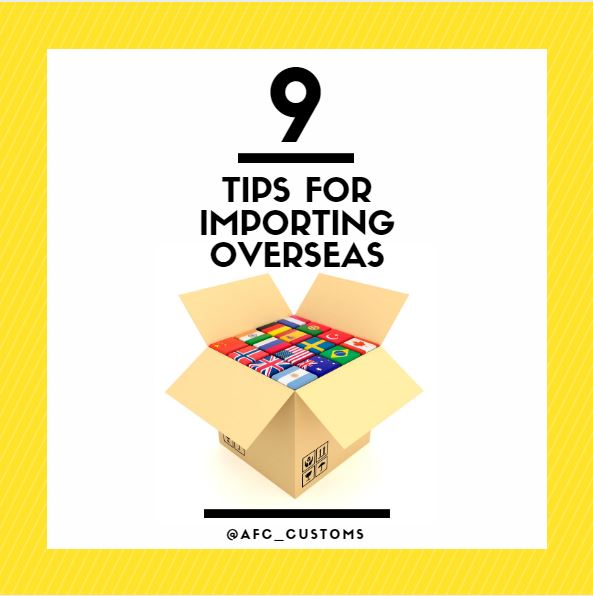Importing overseas from Europe, China and other areas of the world is big business for importers. Are you prepared to import products from these areas to the United States? We’ve got 9 tips for importing overseas to help point you in the right direction.

Make Sure There is Import Demand
Importers need to perform import demand research before they begin their overseas research. There’s nothing worse than being stuck with a bunch of merchandise that you’re not able to sell once you import goods to the United States. Make sure your imports are sellable at home before you do your homework overseas.
Calculate Costs
Calculate all of the charges and costs associated with placing an overseas order before you sign on the dotted line. You want to make sure you have all of the costs covered so you know what your profit margin will be ahead of time. In addition to your product, here are some additional costs to include:
- Storage costs
- Finance charges
- Duty and fees
- Licensed Customs Broker fees
- Freight forwarder fees
- Transport costs
- Insurance costs
Review Costs Closely
Importing overseas is both big business and tricky business. You can review Customs duty and fees with a Licensed Customs Broker to make sure all these costs are factored into your budget.
Conduct Competitor Research
It’s always a good idea to perform research to see what your competitors are doing and more importantly, what they are selling.

A Licensed Customs Broker can help your overseas imports arrive safely on U.S. soil.
Create a spreadsheet of products, product specs and retail prices for your competitors. Then match those numbers up against your imports. If your imports don’t have a price advantage or aren’t as unique, you have some more work to do.
Check Your Cash Flow
When you place an order for imports overseas, it’s always cheaper to place a larger order. Large orders bring down the cost of your order but large orders require a large chunk of cash or a letter of credit upfront. Make sure your cash flow is adequate before you place your overseas orders. Be prepared for Customs inspection costs, especially on initital imports, which can add cost to your bottom line.
Find Reputable Suppliers
Sometimes it’s difficult to find reputable suppliers that make reliable products from overseas. Place orders only on terms that include penalties for non-delivery, inferior goods or late delivery. If you have the capital, you should also find alternative suppliers to provide backup imports in case your main supplier falls through. Reputable suppliers deliver on schedule, keep you informed of delays, deliver on time and make products at the level of quality you expect. Ensure your suppliers produce products which comply with U.S. government regulations and you have necessary permits to import the products.
Learn the Language
Importing overseas can be difficult if you don’t know the language or how to deal with suppliers in foreign countries. Remember that you’re very likely to be dealing with people speaking different languages and of a different culture.
Hint: Using email is typically a better way to communicate with overseas suppliers and it also creates a written record of your correspondence.

Prepare Your Orders for Importing Overseas
Once your products are ready for importing, you can clear customs by having the following import documents on hand for your Licensed Customs Broker and U.S. Customs and Border Protection (CBP):
- A commercial invoice that lists the purchase price, country of origin and tariff classification of your items.
- A packing list detailing your imports.
- A bill of lading that lists goods in the form of a receipt.
- An arrival notice from the U.S. agent.
For shipments arriving to the U.S. on ships, an Import Security Filing (ISF) must be filed with CBP no later than 24 hours prior to the loading of cargo on the vessel. Your Licensed Customs Broker can help you with this filing, which is your responsibility as an importer.

